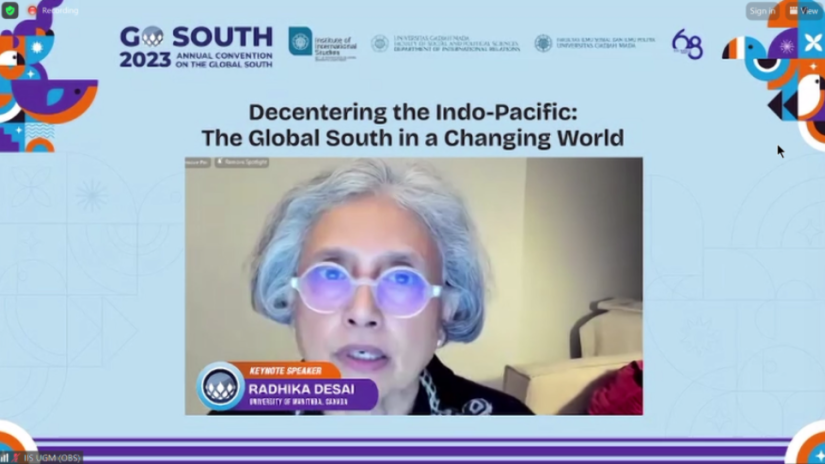
Yogyakarta, November 6th 2023─Welcoming the 68th Dies Natalies of FISIPOL, the Department of International Relations held the Annual Convention on The Global South (Go South) on Monday (06/11) through the Zoom Meeting. The conference presented keynote speaker Dr. Radhika Desai (University of Manitoba), and speakers Dr. Nobuhiro Aizawa (Kyushu University), Prof. Dr. Poppy S. Winarti (Universitas Gadjah Mada), and Marc Saxer (Friedrich-Ebert-Stiftung ing the Asia Pacific). The speakers’ presentation was hosted by Muhadi Sugiono and Luqman-Nul Hakim (Lecturer of the Department of International Relations, Faculty of Social and Political Sciences UGM).
Go South is an activity initiated by the Institute of International Studies and the Department of International Relations since 2019. Go South 2023 aims to be a platform to provide discussions on the dynamics in the Indo-Pacific from various perspectives.
“Changes that occur in the Indo-Pacific region will potentially open up space for countries in the Indo-Pacific region to navigate their projections in the changing world order. The organization of Go South 2023 by the Institute of International Studies as the host is a commitment to understand the dynamics of the Indo-Pacific through this annual conference,” said Prof. Dr. Puji Astuti, S.Si., M.Sc., Apt, Director of Partnership and Global Relations UGM.
In her keynote speech, Radhika Desai explained about the “Geo Political Economy of the Indo-Pacific: War vs Development” which highlighted the power of the North and South region exemplified by the tension between China and the United States as superpowers in the world economy and the position of the Indo-Pacific in the international order.
“We may see more wars as long as there is no political change in America. But they may yet realize the one laboratory element of the original Indo-Pacific idea of Asia free from the domination of Anglo-American and Western European colonialism, and a leader in the formation of a new international order,” Desai explained.
Meanwhile, the Indo-Pacific is emerging as a world economic and strategic center where development and rising powers compete with each other. It is the world’s fifth-largest economy, has the world’s most democratic countries, has several developed militaries, has nuclear as a leading superpower tool, and is emerging as a maritime challenger.
“Undoubtedly, the Indo-Pacific is power politics and shaped by great powers. The Global South believes that the Indo-Pacific is a complex socio-political reality of independence and connectedness that all parties need to fight for stability,” Muhadi Sugiono explained.
The annual conference on Indo-Pacific is the Faculty’s commitment to achieve SDGs point 17 on Partnership to achieve goals.
